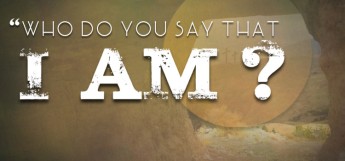These reflections were first offered on 27 August 2017 at a communion service in Dry Drayton and a service of Morning Worship in Caldecote in a series on ‘classic gospel stories’ (following the Revised Common Lectionary). The gospel reading for the day was Matthew 16: 13-20
Over the last few months and week by week on a Sunday we have been hearing classic stories of Jesus. Some stories that Jesus himself told; some stories of words of wisdom that he imparted to his disciples and the crowds; some stories of conversations that he had with others around him. This morning we heard the story of Jesus asking his disciples two questions. It is with the first of these that I want to start.
 Jesus asked his disciples the question, “Who do people say that I am?” (He uses the term Son of Man to point to himself).
Jesus asked his disciples the question, “Who do people say that I am?” (He uses the term Son of Man to point to himself).
I wonder, when you look around you, at family members, friends, neighbours, work colleagues and so on, who do they by and large think Jesus is?
A piece of research was conducted in 2015 sponsored by the Church of England and leaders from a range of other UK denominations. Its popular title was ‘Talking Jesus’ though it had a much longer academic title too. Amongst other things, the research asked questions about faith and Jesus of a cross-section of the ordinary population.
First, they asked people whether they called themselves Christians. And they discovered that 57% of UK adults said they were Christians, and 9% said they were committed, practising Christians, that is they read the Bible, pray and go to a church regularly.
Then they asked people who they thought Jesus was? And judging by the results 21% of adults in the UK think Jesus is God in human form; while 30% think he is a spiritual leader or prophet; but only 60% think he was an actual, real historical person.
I wonder if you have ever thought about the historical evidence for Jesus as a real person. It is something that we obviously need to talk about a bit more!
The historical evidence for Jesus
Lee Strobel in the book ‘The Case for Christ’ points out that “If you have never read the Bible or any Christian writings, you could learn about Jesus from an ancient Jewish work called the Talmud and from ancient historical writers such as Josephus, Tacitus and Pliny the Younger,” who are all ancient historians of some repute. If you did some investigation into these sources you could discover these things: that Jesus was a Jewish teacher in what we now call the first century AD. You would read reports that many people believed he performed healings and other miracles, and that some people believed he was the long-awaited Messiah. And you would read that this real person was rejected by the Jewish leaders and that he was crucified under the authority of Pontius Pilate in the reign of Tiberius. You would also read that even after his recorded death the number of those who worshipped Jesus as God spread beyond Palestine so that there were large numbers of them in Rome by AD64, and they consisted of all kinds of people – men and women, slave and free, and from many different nationalities. (p67)
The accounts of eye-witnesses
So much for historical accounts outside the Bible. But how far can we trust the accounts about who people thought Jesus was in the Bible itself?
Tim Keller’s book, ‘The Reason for God’ examines the most often stated objections to the Christian faith, including whether the gospels were accurate. Calling on other scholars, most notably Richard Baukham, he argues that “at the time the Gospels were written there were still numerous well-known living eyewitnesses to Jesus’ teaching and life events. They had committed [the stories] to memory and they remained active in the public life of the churches throughout their lifetimes”. There is evidence in the gospels themselves, Baukham believes, to show that the Gospel writers “named their eyewitness sources within the texts to assure readers of their accounts’ authenticity.” (p101) (Baukham’s book, which Keller references, is ‘Jesus and the Eyewitnesses’. A shorter summary of Baukham’s argument is in Grove booklet B48 ‘The Gospels as Eyewitness Testimony’).
Christian faith, including whether the gospels were accurate. Calling on other scholars, most notably Richard Baukham, he argues that “at the time the Gospels were written there were still numerous well-known living eyewitnesses to Jesus’ teaching and life events. They had committed [the stories] to memory and they remained active in the public life of the churches throughout their lifetimes”. There is evidence in the gospels themselves, Baukham believes, to show that the Gospel writers “named their eyewitness sources within the texts to assure readers of their accounts’ authenticity.” (p101) (Baukham’s book, which Keller references, is ‘Jesus and the Eyewitnesses’. A shorter summary of Baukham’s argument is in Grove booklet B48 ‘The Gospels as Eyewitness Testimony’).
Just a spiritual teacher or something more?
So, if he really lived who was he? Could he have been just a great spiritual leader or moral teacher? CS Lewis (of the Narnia books) famously put forward the argument that Jesus was either mad, bad or God. In the book ‘Mere Christianity’, he wrote: “Some people are prepared to say about Jesus: ‘I can accept that he was a great moral teacher, but I don’t accept his claim to be God.’” He goes on: “a man who was merely a man and said the sort of things that Jesus said would not be a great moral teacher. He would either be a lunatic – on a level with a man who says he is a poached egg [in Lewis’ words] or else he would be the Devil of Hell [again Lewis’ words]. Either this man was, and is, the Son of God: or else a madman or something worse. You can shut him up for a fool, you can spit at him and kill him as a demon; or you can fall at his feet and call Him Lord and God.” What you cannot do is call him merely a great human teacher. (p52)
‘Jesus is Lord’
Then Jesus asked those around him, his disciples, ‘who do you say that I am?’
 Who do you say that Jesus is? If, like Peter we are prepared to say ‘you are the Messiah…’ or its non-Jewish alternative ‘You are the Lord’ what do we mean by it?
Who do you say that Jesus is? If, like Peter we are prepared to say ‘you are the Messiah…’ or its non-Jewish alternative ‘You are the Lord’ what do we mean by it?
If ‘Jesus is Lord’ is worth the paper it is written on or the breath which spoke it, then Jesus becomes Lord of the whole of our lives. It is not just something to say, but something to live. Jesus is Lord not just of Sunday, but of Monday and Tuesday and the whole of the rest of the week. Lord not just when we are in a sacred building, but when we are in all the other places we spend time in. Lord not just when we are with other Christians, but Lord when we are with family, with colleagues, with friends, with neighbours.
For the disciples to say: Jesus is Lord, in the face of the fact of his ignominious death must have seemed to some like madness. And yet, something so astounding must have happened that it made perfect sense for them to do so and to risk much in continuing to do so. Surely if Jesus really had died and stayed dead like any normal human being, before too long they would have become a narrow and defensive cult rather than a rapidly growing worldwide movement.
In some places even now, to say ‘Jesus is Lord’ is physically dangerous. Losing your livelihood, losing family, losing your life even, and yet people still convinced enough to say it, and live it.
Our faith in the west is often much more gentle (some would say) or lukewarm (others might say), as our culture lulls us into a false sense of security and understanding of how the world works. And perhaps we should do something about that.
However if we say ‘Jesus is Lord’ then we are members of a movement of followers and worshippers of Jesus.
I don’t know about you, but at those times when I feel doubt or wonder is it worth it, I remember all those who have been and are a part of this movement, even in the face of persecution, and I remember the weight of the historical evidence, and the evidence of eye-witnesses and the implications of what Jesus himself said. And I take courage and encouragement from them to say again, with them, ‘Jesus is Lord’.
Bibliography
The Talking Jesus research can be found at www.talkingjesus.org where there is a 2 minute animation of the findings and an easy to read booklet and a more detailed report.
Lee Strobel, The Case for Christ – I quoted from the youth edition.
CS Lewis, Mere Christianity
Tim Keller, The Reason for God
Richard Baukham, Jesus and the Eyewitnesses
Richard Baukham, Grove booklet B48: ‘The Gospels as Eyewitness Testimony’
![]()
